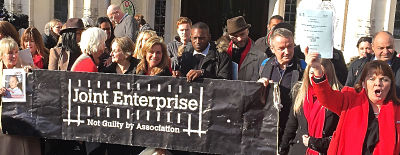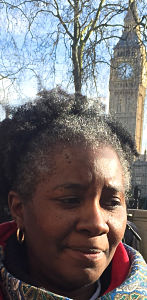London, UK -– Often lost amidst the damning evidence of injustice in the enforcement of Britain’s notorious legal doctrine of joint enterprise are real people like Susan Williams –- persons whose lives have been shredded by the JE doctrine that Britain’s Supreme Court just gutted in a dramatic ruling today.
Williams’ grandson is serving a life sentence under joint enterprise which permits convictions carrying long sentences even of persons who did not commit a crime or even know a crime would occur. Williams said her grandson was trying to break up a fight in 2010 that ended in a fatal shooting by others, yet led to his conviction under JE.
The nightmare for Williams following the joint enterprise arrest and conviction of her grandson, Trevelle Williams, got much darker last November when her youngest daughter, the mother of Trevelle, committed suicide.
Williams’ daughter, Tara Le, was distraught over her inability to free her son Trevelle, nicknamed Bluey, from what the Williams family and others saw as a wrongful conviction.
“The last thing she said to me was ‘Mom, no one is listening.’ Tara said lawyers, the courts and human rights people would not respond to her or the evidence she had uncovered,” Williams said during an interview the day before Britain’s Supreme Court announced its historic ruling on JE.
That unanimous decision by Britain’s highest court, rendered on February 18, 2016, sets new legal standards for joint enterprise saying older standards had been applied too loosely by police, prosecutors and courts for over 30-years.
The President of Britain’s Supreme Court, Lord Neuberger, before reading the decision before a courtroom packed with persons, most opposed to JE, said, “We consider that the proper course for this court is to re-state as nearly and clearly as we may, the principles which had been established over many years before the law took a wrong turn.”
 Deb Madden (far right) holds ruling outside British Supreme Court building. LBW Photo
Deb Madden (far right) holds ruling outside British Supreme Court building. LBW Photo
The Court’s unanimous ruling stated that an error had been made in the mid-1980s when law enforcers, from police through judges and legislators, began equating intent to commit a crime and/or intent to participate in a crime with the contention advanced by enforcers that persons arrested for a crime should have exercised “foresight” in knowing a crime could occur. This led to people being charged and convicted and sentenced simply for having the “bad judgement” or “lack of foresight” to show up at the scene of a crime, even if they weren’t personally involved.
Many JE convictions, particularly of persons who did not commit the actual crime or who were not even present when that crime occurred, rested on the principle that they should have exercised such “foresight” and stayed away.
The JE ruling by Britain’s highest court is seen as a victory for JENGbA, the advocacy group composed mainly of women with family members serving JE sentences. JENGbA — for Joint Enterprise Not Guilty by Association — used everything from street protests to courtroom actions and appeals to Parliament in its effort to challenge JE enforcement that have produced convictions that have helped drive mass incarceration in Britain.
JENGbA founder Gloria Morrison said she was “overwhelmed” by the high court’s ruling. Morrison gave credit to British lawyer Simon Natas for his advocacy and pro bono services in JENGbA in its years-long struggle against JE.
Natas said the Supreme Court “showed extreme courage to declare the law took a wrong turn.” He said the struggle now shifts to working to free innocent persons already wrongly convicted under JE.
Patricia Brown, a JENGbA member like Susan Williams, has a son serving a JE life sentence for a fatal fight that occurred when her son was at home.
 Patricia Brown outside Supreme Court after historic ruling. LBW Photo
Patricia Brown outside Supreme Court after historic ruling. LBW Photo
“I feel we’ve made quite a few steps forward,” Brown said of the high court ruling. “Joint enterprise is a waste of taxpayers’ money. Hopefully my son’s sentence will be abolished.”
Estimates of the number of persons in Britain sentenced under joint enterprise range from hundreds to over 4,500 since just 2005. The failure to have exact figures on JE convictions results from the failure of Britain’s government to record such figures, according to a July 2014 report published by Britain’s Bureau of Investigative Journalism.
That BIJ investigation, drawing on figures from Britain’s Crown Prosecution Service, listed 4,590 JE convictions between 2005-2013. According to the BIJ investigation, “Those persons had varying levels of the role in the crimes. Some played an active part, others might have been caught up through association.”
That BIJ investigation also revealed that few appeals from JE convictions are successful. During years 2008, 2012 and 2013 courts in Britain only granted four of 38 JE sentence appeals.
Investigations of flaws in JE by Parliament, university researchers and rights organizations have repeatedly cited gross racial disparities in JE enforcement, an element of JE that is too often downplayed in wider public discussions on JE, according to Stafford Scott, a noted rights activist in London.
“What does not get talked about is the racial motivation behind JE,” Scott said, speaking in the hallway outside the courtroom following the Supreme Court’s ruling. “Families have been tortured, with loved ones in prison for crimes that were never intended to be crimes.”
A report on JE released by Parliament two years ago stated, “It is clear that a large proportion of those convicted of joint enterprise offences are young Black and mixed-race men.”
That report from Parliament’s House of Commons noted:
“Several of our witnesses used the metaphor of a ‘dragnet’ to describe the operation of joint enterprise, claiming that it was hoovering up young people from ethnic minority communities who have peripheral, minor or even in some cases non-existent involvement in serious criminal acts, along with the principal perpetrators of those acts, and imposing draconian penalties on them.”
Noel Williams, a former gang leader in London who is now months from college graduation, endured four JE arrests that included one JE prosecution that resulted in an acquittal. Williams applauded the high court ruling.
“I think it is a good day and a very big start,” Williams said.
